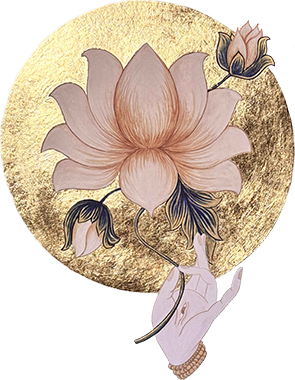










Sacred Geometry - Mandala - ArteSanae Collection
Ayurvedic Medicine and Sacred Geometry
The Mandala of the Five Elements is a powerful tool used in various spiritual and therapeutic practices. Its geometric representation is rooted in the philosophy of the Five Elements, the foundation of Ayurvedic medicine, which explains the relationship between diseases and their treatments, and was later integrated into Tibetan medicine.
Any imbalance in our emotional and spiritual lives is reflected in physical ailments. The Mandala establishes a correspondence between the human being and spirituality, functioning as a meeting point between the microcosm and the macrocosm. It is used to diagnose and understand the relationship between illnesses and treatments, uncovering the causes of imbalances and addressing them through natural healing processes.
The Fundamental Five Elements
The 5 Elements are characterized by their shapes and colors:
- WATER: circle - white - liquids. Transforms anger and aggression.
- EARTH: square - yellow - feeling of heaviness and lightness. Transforms pride and selfishness.
- FIRE: triangle - red - temperature. Transforms passion and desire.
- AIR: crescent moon - green - movement. Transforms envy and jealousy.
- SPACE: seed shape (drop) - blue - thoughts and mind. Transforms ignorance and foolishness.
In the Mandalas, the elements can be represented by their geometric shape or by their respective color.
Symbolic Elements
- The first triangle, pointing downward, represents the vagina, birth, creation, and life, symbolizing the EMBRYO.
The following triangles represent:
- SHIVA (masculine): Genes/consciousness of the father.
- SHAKTI (feminine): Genes/activation of the mother.
The union of Shiva and Shakti symbolizes the cosmic duality that, when fused, represents divine unity and the creation of the universe.
Anatomy of the Mandala
- 8 petals: represent the internal airs and the central channel SHUSHUMNA.
- 16 inner petals: symbolize bones.
- 16 outer petals: represent muscles, skin, and blood.
The Lotus petals are related to different energy centers in the human body.
The two white squares that create an 8-pointed star represent the physical body of Man/Woman, with white being the color of water, of which we are mostly composed.
The fine lines with white dots around the squares represent the NADIS, while the white dots on a black background between the petals represent the NERVOUS SYSTEM.
The crescent moon shape in Ayurvedic medicine is associated with feminine energy, the mind, emotions, and tranquility; it represents the balance between opposing energies, similar to the union of Shiva and Shakti, symbolizing harmony between the mind and body.
Benefits of Meditation
This Mandala is essential in meditation and spiritual practice, acting as a focal point that promotes mental calmness and connection with spirituality and self-discovery. Each element of the Mandala is associated with specific emotions, helping to balance emotional and physical states, according to Ayurvedic medicine.
Contemplating the Mandala allows for reflection on the relationship between human beings and the universe, inspiring awareness, responsibility, and respect for the impact of our actions. Meditating on the shapes and colors of the Mandala enhances awareness of how our individual experiences align with universal forces, promoting personal growth and overall well-being.
Universal Connection
In summary, the Mandala of the Five Elements represents harmony and the need to be in tune with the totality of existence, integrating emotional and spiritual healing with a deeper and more meaningful connection to the cosmos. It serves as a reminder that by understanding and working on ourselves, we also contribute to the creation
SACRED GEOMETRY - ARTESANAE COLLECTION
-
SRI YANTRA
Regular price From €135,00Regular price -
METATRON'S CUBE
Regular price From €135,00Regular price -
TIBETAN COSMOLOGY
Regular price From €135,00Regular price -
FLOWER OF LIFE
Regular price From €135,00Regular price -
FIVE ELEMENTS
Regular price From €135,00Regular price -
DEEP EARTH
Regular price From €135,00Regular price -
GODDESS PRAJNAPARAMITA
Regular price From €135,00Regular price -
GOLD TRIQUEL
Regular price From €135,00Regular price -
GOLDEN WAVE
Regular price From €135,00Regular price -
PRAJNAPARAMITA
Regular price From €135,00Regular price
























